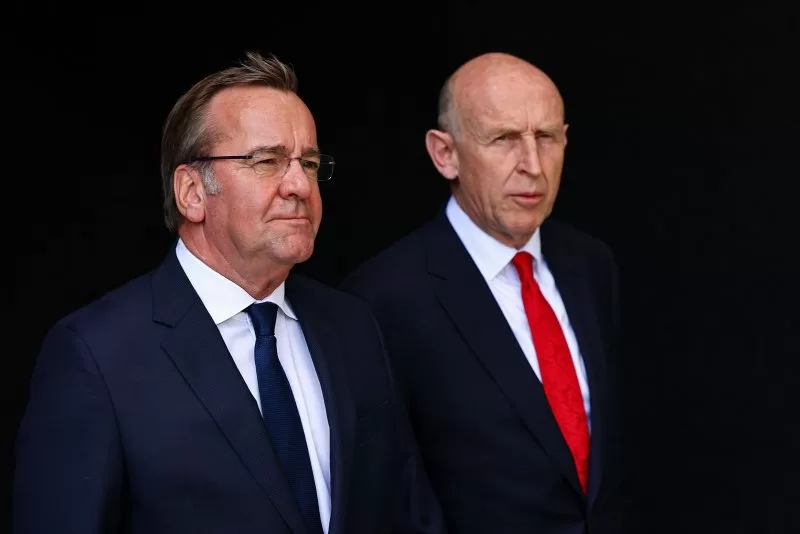German Defense Minister Boris Pistorius (L) and the British Secretary of State for Defense John Healey walk to lay a British wreath of flowers for the German soldiers who died in the line of duty, in Berlin, Germany, on July 24, 2024. They are expected to sign a significant security pact in London on Wednesday that will see their two militaries work closer together. File Photo by Hannibal Hanschke/EPA-EFE
Oct. 22 (UPI) — Britain and Germany have agreed to a significant military pact that will see the two allies work together on weapons projects and defense amid the growing threat Russia poses to the European continent.
The so-called Trinity House Agreement is set to be signed Wednesday by Britain’s defense secretary, John Healey, and his German counterpart, Defense Minister Boris Pistorius, at the London location bearing the pact’s name.
Key aspects of the agreement include the joint — and rapid — development of a new weapons system that can fire with greater precision and at a longer range than even the British-French air-launched long-range Storm Shadow, which has a distance in excess of 155 miles.
It will also direct their two armies to train and conduct exercises together along NATO’s Eastern Flank near Russia, using the region “as a catalyst for developing new ways of fighting,” Britain said in a statement.
Germany added in a statement of its own that the focus will be on the vulnerable Baltic states, and through joint exercises, the agreement ensures that the land forces there can “effectively deter, and in the event of an attack on NATO’s territory, and defend us.”
Both Germany and Britain are members of the 32-nation NATO defensive alliance.
Under the agreement, the two countries will also collaborate on developing land-based drones as well as drones that can operate alongside fighter jets.
“The Trinity House Agreement is a milestone moment in our relationship with Germany and a major strengthening of Europe’s security,” Healy said in a statement.
The ambitious agreement covers defense projects and concerns across all domains: air, land, sea, space and cyber. Britain added that it will also bring artillery gun barrel manufacturing back to the country for the first time in 10 years, as the agreement paves the way for a new factory to be built within its borders.
Negotiations on the agreement began in July when Healy visited Berlin.
The announcement was made as Britain, the United States and other allies have been warning that President Vladimir Putin of Russia has turned to North Koreans to fill his army in his war against Ukraine.
Pyongyang has denied the allegation, but Seoul’s spy agency last week said the isolated regime had decided to send some 12,000 troops in support of Russia’s war effort, with 1,500 special forces already dispatched to Vladivostok.
Prime Minister Keir Starmer on Tuesday also accused Russia of increasing attacks on Ukrainian port infrastructure in the Black Sea, affecting aid from reaching Palestinians in Gaza in a gamble to pressure Ukraine into submission.
“Russia has no respect for the norms and laws that govern our international system,” he said in a statement.
The agreement was also announced as Putin was hosting Chinese leader Xi Jinping, as well as the leaders of India and South Africa.
Meanwhile, the United States and Germany on Tuesday signed a bilateral, non-binding Security of Supply Agreement to ensure both countries can acquire the industrial resources they may need.
Specifically, the Pentagon stated that the agreement intends to enable the two countries to support each other’s delivery requests for procurement of critical national defense resources.

